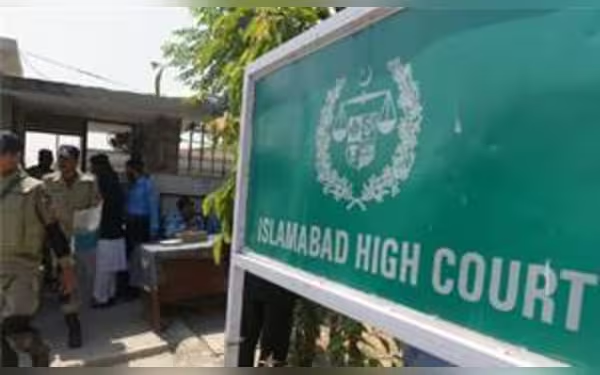Saturday, November 16, 2024 05:53 PM
IHC Ruling Empowers Prisoners' Political Expression Rights
- IHC upholds prisoners' rights to political discussions.
- Rule 265 deemed 'ultra vires' by Islamabad High Court.
- Court challenges restrictions on prisoners' communication.
 Image Credits: nation_pk
Image Credits: nation_pkIHC rules against ban on prisoners' political talks, affirming their rights to free expression.
The Islamabad High Court (IHC) has recently made a significant ruling regarding the rights of prisoners in Pakistan. On Tuesday, the court addressed an intra-court appeal concerning Rule 265 of the Jail Rules, which previously prohibited prisoners from engaging in political discussions during their meetings with visitors. This ruling is crucial as it touches upon the balance between prison regulations and the fundamental rights of individuals, even those incarcerated.
The case arose when Chief Commissioner Islamabad filed an appeal against a decision made by a single bench of the IHC, which had declared Rule 265 as "ultra vires," meaning it was beyond the legal authority granted by the law. The division bench, consisting of Chief Justice Aamer Farooq and Justice Saman Rafat Imtiaz, heard the appeal but chose not to suspend the earlier verdict immediately. Instead, they issued notices to Pakistan Tehrik-e-Insaf (PTI) leader Sher Afzal Marwat, who had initially challenged the rule.
In his ruling, Justice Sardar Ejaz Ishaq Khan pointed out that the rule imposed a blanket ban on political discussions, which he deemed excessive and unjustified. He emphasized that the law does not explicitly prohibit such discussions, and the arguments presented by the prison authorities regarding maintaining discipline were seen as mere rhetoric. The judge stated, "The sweeping counter-argument that political discussions can disrupt discipline in the prisons is just empty rhetoric, and deserves no more respect than arguments premised on the hackneyed expressions of 'national security concerns' used often as the mask for repressive measures." This statement highlights the court's commitment to ensuring that prisoners retain their rights to free expression, even within the confines of a prison.
Rule 265, as it stood, limited prisoners to one letter and one interview per week, with strict guidelines on the content of these communications. The rule explicitly stated that discussions of political matters were not allowed, and any letters sent by prisoners could not reference politics or prison administration. This ruling by the IHC challenges the validity of such restrictions, suggesting that they may not hold up under scrutiny.
The IHC's decision is a landmark moment for prisoners' rights in Pakistan. It raises important questions about the extent of freedom of expression for individuals who are incarcerated. The court's ruling indicates a shift towards recognizing that even prisoners should have the right to discuss political matters, which is a fundamental aspect of democratic society.
As this case unfolds, it will be interesting to observe how the Punjab Government responds and whether they will seek to amend the existing rules to align with the court's findings. The implications of this ruling could resonate beyond the prison walls, potentially influencing broader discussions about civil liberties and human rights in Pakistan. Ultimately, this case serves as a reminder that the rights of individuals, regardless of their circumstances, must be upheld and protected.













